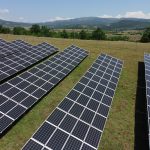Climate Action Network (CAN) Europe’s new report on “The Real Costs of Coal: Muğla” shows how expanding coal mines and extending the life-span of coal-fired power plants threatens tourism and other sectors as well as the health of local communities and ecosystems. The report calls upon Turkish authorities to embark upon the urgent shift to clean, renewable energy instead, in the face of the worsening climate crisis. Muğla, a popular travel destination on the southwest coast of Turkey, must not be left without a future beyond coal.
The research is a case study of one of Turkey’s dirtiest coal power infrastructures that took over a region best known for its tourism hotspots such as Bodrum, Fethiye and Marmaris. The report shows lignite mines pollute the air, land and sea and are at odds with all other economic sectors. They pushed local communities to the brink by relocations and destruction of health, livelihoods and the environment. They continue to expand without transparent environmental impact assessments and despite strong opposition by local communities.
The International Panel on Climate Change (IPCC) landmark 1.5°C report calls for the phase-out of all coal by 2050, and in OECD countries by 2030. Retirement age coal mines and plants should be the first to close. Yet, as the case of Muğla region shows, Turkey is considering extending the lifespan of the region’s three coal power plants at Yatağan, Yeniköy and Kemerköy.
The Report “The Real Costs of Coal: Muğla” shows that:
- The three coal plants have already released 360 million tons of CO2 since becoming operational. They now threaten the release of a further 328 million tons of CO2 if they get lifetime extensions and operate to the full 50-year life cycle as opposed to being retired.
- In total, the three coal plants of Muğla are responsible for the release of 9.5 million tons of sulphur dioxide, 890,000 tons of nitrogen oxides, 65,000 tons of dust and 28,000 kg of mercury since they became operational in 1983.
- This pollution has caused more than 45,000 premature deaths, hospitalization of around 46,000 people due to respiratory and cardiovascular illnesses from air pollution and the loss of 12 million working days, according to the health impact modeling employed by the new study.
- If the remaining lignite mining areas of the Muğla region in Turkey become operational as planned, the total of 18,450 hectares of forest will be lost – almost 17 times as much as in Hambach, Germany – the site of an iconic stand-off between expanding coal mines and environmental campaigners.
“The report finds the continuation of coal exploitation effectively robs the region of future beyond coal by inevitably stripping it of people, communities, agricultural land and natural resources like forests and clean water. This is make-or-break time for Muğla: now is the time to embark upon urgent and just transition away from coal and ensure the region’s future – not invest more into its costly past”, explains CAN Europe’s Elif Gündüzyeli, lead author of the report.
“The current heatwave in Europe is a timely reminder of the urgency with which climate action must be taken everywhere and that means no more coal. Instead of expanding coal mines and power plants, countries like Turkey should follow the Paris Agreement, by investing all available resources into the urgent and inevitable transition to sustainable, renewable energy systems while supporting communities in coal regions to build a future beyond coal”, underlines Wendel Trio, CAN Europe’s director.
“Coal power plants not only fuel climate change, but they also release thousands of tons of air pollutants. The Mugla report underlines the huge threat to public health from coal power generation. The move away from coal to a healthy energy future is overdue”, said Anne Stauffer, Director for Strategy and Campaigns at Health and Environment Alliance (HEAL).
ENDS
Download full report here: The Real Costs of Coal: Muğla
Contact: Stevan Vujasinovic stevan@caneurope.org +381 (0)63 390 218
Climate Action Network (CAN) Europe is Europe’s leading NGO coalition fighting dangerous climate change. With over 160 member organisations from 35 European countries, representing over 1.700 NGOs and more than 40 million citizens, CAN Europe promotes sustainable climate, energy and development policies throughout Europe.



